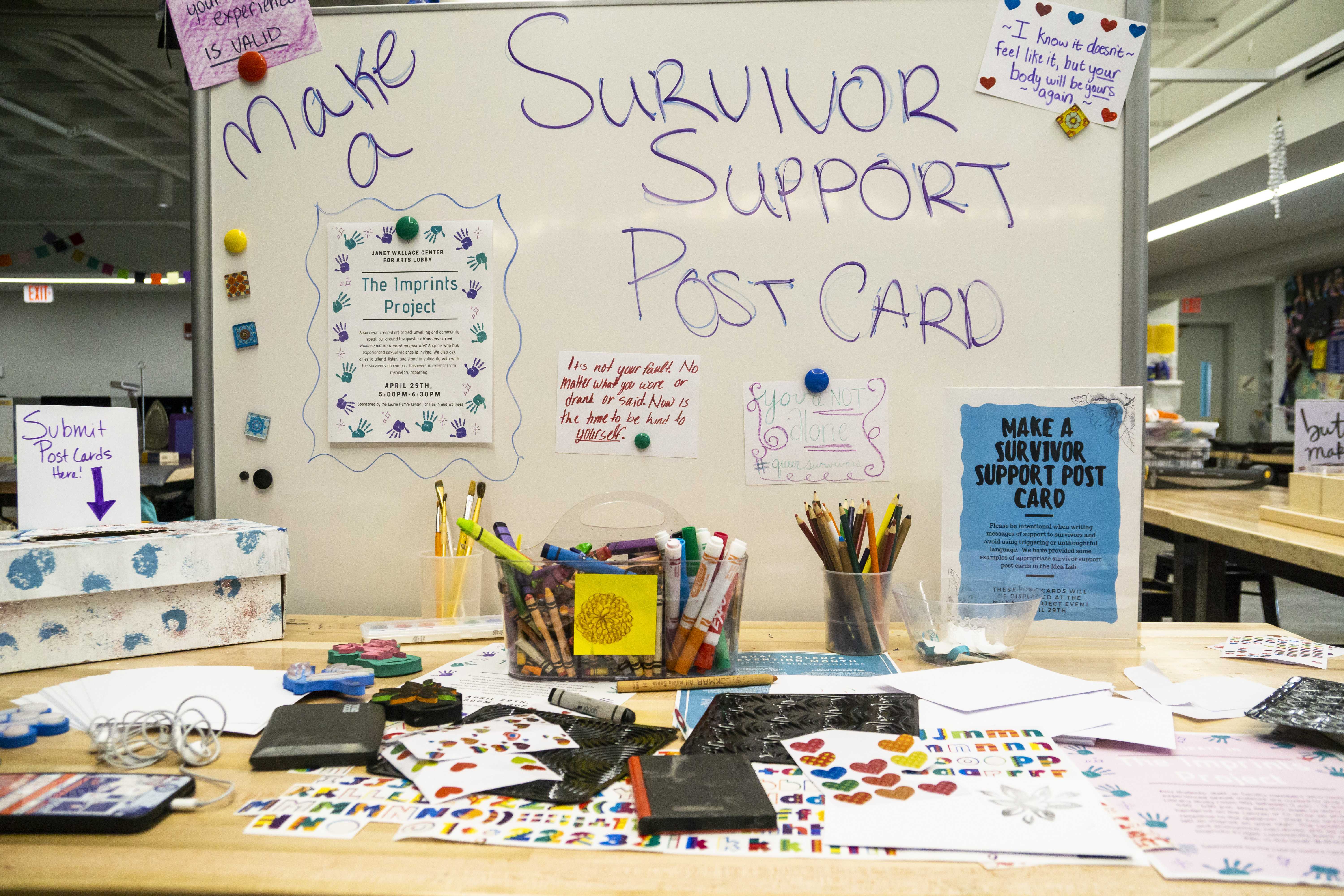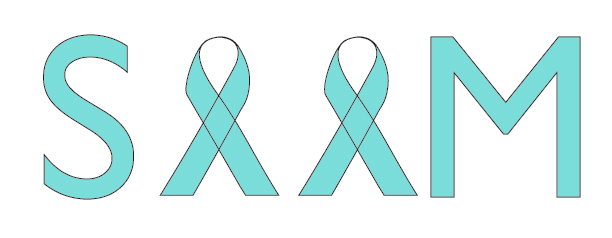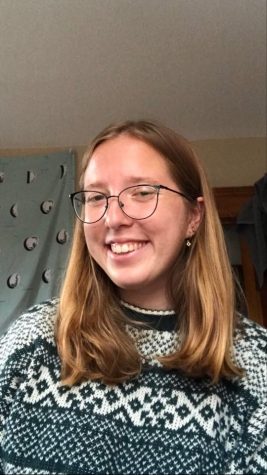Students report lack of support for survivors on campus
April 25, 2019
Please be advised: this article contains discussion of sexual violence, sexual harassment and vulgar language.
Update 4/26: on the morning of 4/25, President Brian Rosenberg announced in the MacDaily that Title IX, Bias and Harassment coordinator Timothy Dunn had decided to resign from his post, effective 4/30. As of 4/26, Macalester administration had no further comment on the circumstances of Dunn’s departure.
Title IX, Bias and Harassment Coordinator Timothy Dunn, and the Office of Title IX more generally, are under scrutiny as President Brian Rosenberg evaluates a nearly 30-page report detailing negative student experiences with institutional handling of sexual violence and harassment.
However, student dissatisfaction with the lack of survivor support extends far beyond any one individual. Some students have had positive experiences with Dunn, but struggled with broader institutional flaws and unstructured response protocol.
When one student discovered their harasser had been hired as an Orientation Leader (OL) this spring, Dunn was quick to remove the respondent from their position. The student had filed a Title IX report in fall 2017, before Dunn’s arrival at the college.
“My experience with Timothy was actually surprisingly positive during this time,” the student, who asked to remain anonymous, said. “[Dunn] was like, ‘Thank you for letting me know. Do you feel unsafe? Do we need to issue a no-contact order? Do we need to have [this individual] not come on campus unless class is happening?’
“[Dunn] was helpful,” they continued. “I was really scared because I filed [the report] in December of 2017, and now it’s the spring of 2019… but he was really helpful.”

However, this isn’t the first time an OL with a Title IX complaint in their file was approved into the program. In spring 2018, a similar incident occurred, and the OL was again removed from their position. At the time, Dunn called the oversight a “glitch.”
Since then, Dunn said he has introduced a new protocol requiring department and office heads to vet potential student employees and leaders through the Title IX office. While this protocol is not a written policy, Dunn said that offices have been compliant with the process so far.
“Each person on the OL list was clear when they were selected,” Dunn wrote in an email to The Mac Weekly. “Any subsequent changes occurred as a result of a report filed AFTER the selection process was complete.”
It is unclear, then, how an individual with a report in their file from 2017 wound up as an OL for New Student Orientation 2019.
Dunn declined to comment further on how the OL was approved in the first place and if Title IX reports are disqualifying for student leadership positions.
Regardless of why the individual was approved into the program, the student who reported it believes it was worth reaching back out to Title IX and correcting the issue to ensure the safety of the first-years who will arrive next semester.
“First-years are so scared to find friends,” the student said. “They’re so nervous, they’re so vulnerable to find people that like them. When [this individual] is in a space [with] first-year girls or first-years period, and [this individual] is like, ‘Hey, I’ll be nice to you,’ it’s so easy for these vulnerable first-years to cling on and be like, ‘Yes.’
“That’s what I expressed [to Dunn], too,” they continued. “I was like, ‘That’s the reason I filed my report.’ At first, I thought [this individual] was just being nice. And then [they] would follow me to my room and put [their] hand in my door so that I couldn’t close the door. [This individual] would come into my room and not leave.
“I’m so scared of [this individual] being around underage girls who are vulnerable and who are scared and who are coming in on their first week,” the student said. “To have that be your intro, to have that be your support system — somebody who’s a potential predator to be the first person, the first authority figure that you meet at Macalester — is ridiculous and that should not be happening.”
Others share the desire to protect future students from that trauma.
“There are rapists on campus,” Saskia Sackner-Bernstein ’21 said. “I know of some of them, and there’s a blacklist… that’s gone around. I haven’t seen it, but I’ve heard names.
“But there’s gonna be a new class of freshmen next year and they won’t know their names,” she continued. “They will be vulnerable… being able to protect the next incoming class from people who are on campus who are looking to prey on young and vulnerable people would be huge.”
Those concerns are well-founded. According to statistics from the Rape, Abuse & Incest National Network (RAINN), more than 50 percent of college sexual assaults occur during a student’s first six weeks on campus.
Growing anxiety about protecting students from sexual violence has made itself apparent on campus in a number of ways throughout a semester marked by steadily increasing tension between survivors and the institution.
On the morning of Monday, April 1 — the first day of Sexual Assault Awareness Month (SAAM) — the Macalester community awoke to sexual violence-related graffiti on several campus buildings.
The markings had appeared overnight — black lettering reading “expel rapists,” “fuck rapists” and “support survivors” spray-painted onto the side of the Dewitt Wallace Library, the Leonard Center, Olin-Rice Science Hall and just outside the doors of the Ruth Stricker Dayton Campus Center.
The graffiti surprised some, including Macalester administration, which at the time declined to comment officially on the markings. Some students, however, found the vandalism to be a powerful symbol of solidarity.
“The graffiti made me really realize that other people are hurting in a way that’s akin to me,” Malini Sharma ’19 said. “No one spray paints ‘fuck rapists’ for fun.”
“That felt awesome to see,” Sackner-Bernstein said. “It felt cool to see someone spray paint ‘expel rapists’ and ‘support survivors’… To see it taken down was frustrating because I feel like we should be trying to make this campus as uninviting to rapists as possible.”
Seeing the graffiti motivated Sharma to share her own experiences. Feeling isolated after institutional authorities left recurring instances of sexual harassment unchecked, she was moved by the brazen confrontation of rape culture.
“It made me want to share my story to show that even if you’re not the one who did the graffiti or if you haven’t gone to Title IX, you’re not alone,” Sharma said. “I think there’s this knowledge among women at Macalester, especially as you get older, that this stuff happens, and it happens way more frequently than we’re led to believe.”
Sharma realized three weeks into the fall 2018 semester that a group of students had been perpetuating objectifying nicknames for her and several other women for at least two years.
Sharma said she met with Dunn to discuss her options but left disappointed. Dunn offered to speak to the students in question, to which Sharma agreed, but she received no follow-up.
“I let it simmer down for a month or two, and then I started hearing rumours about myself — about various sexual things I had done with the [harassers,]” Sharma said. “Again, I went to Title IX and was like, ‘Hey, this is happening and I’m really uncomfortable, like, I don’t want to even go to class.’ And they were just like, ‘Well, there’s nothing we can do.’
“Frankly, this put me in a super, super dark place,” she said. “I didn’t want to go to school because I knew I was gonna see them… Honestly, if this had happened any other year, I would’ve transferred.”
Sharma thinks improving Macalester’s sexual violence prevention efforts could keep future students from experiencing that same isolation.
“At Mac, everybody’s like, ‘you’re an adult now.’ And sure, kind of. I feel like we’re adults in training, but we’re also kind of ending our childhood here,” Sharma said. “I think the school has a responsibility to help guide us in certain ways because we are far from home, and we are young and no one knows what they’re doing.
“We’re suddenly thrust into this environment where there’s alcohol and sex and all these other things that are gonna contribute to sexual harassment and sexual assault,” she continued. “I think so far… I think there’s a lack of overall understanding [in Mac’s way of dealing with this.]”
With the goals of promoting healthy ideas about sex and educating students on how to recognize and intervene in unhealthy or dangerous situations, several sexual violence prevention groups have surfaced on campus in the past few years. Some of those include Better Sex at Mac, Feminists in Action/Students Together Against Rape and Sexual Assault (FIA-STARSA) and the Sexual Violence Prevention Student Working Group.
Better Sex at Mac member Halley Norman ’19 thinks groups like these give students the opportunity to make conversations about sexual misconduct and consent more accessible.
“It’s an issue that’s very real at Macalester that isn’t talked about publicly,” Norman said. “I think it’s talked about in small circles or one-on-one between friends, but never on a broader, more public or more institutional scale beyond the very cursory ‘Consent is Mac’ intro during orientation.”
Norman noted that the “Consent is Mac” protocol is itself problematic in some ways.
“There’s a lot more emphasis on bystander education,” she said of the program. “There is much more emphasis on how to make consent natural and how to observe predatory behaviors in other people, not how to observe yourself or catch yourself in the moment.”
Better Sex at Mac member KP Blake-Leibowitz ’19 is leading the charge to re-write Macalester’s protocol with support from the Laurie Hamre Center for Health and Wellness. “I’ve seen perpetrators wearing ‘Consent is Mac’ shirts,” Blake-Leibowitz said. “I’ve seen people not really engaging in this program in a way that gets past the ‘check a box and you’re done’ kind of narrative. It was a lot of people feeling good about themselves and not really considering the way their own actions could be implicated.”
Blake-Leibowitz conducted a survey of student experiences with the program in spring 2018 under the supervision of Director of Health Promotion Lisa Broek. With that feedback in mind, they began putting their revised vision into effect this spring.
“We didn’t do a t-shirt drive this semester,” Blake-Leibowitz said. “We didn’t do a pledge, and we’re talking about rewriting the pledge. The programming is changing to ‘Consent at Mac,’ rather than ‘Consent is Mac,’ so acknowledging this is a program about promotion and education [and] not that consent is 100 percent defined by everyone here.”

This semester, they also piloted a training coalition to allow first-years to explore their perceptions of what consent looks like and what causes sexual violence on and off campus. Dubbed the Consent Peer Educators, the student group will work in tandem with the already-established Sexy Trainers to host a separate, consent-specific workshop in first-year dorms.
While some students work to revise current campus institutions to make room for survivors, others have created entirely new spaces on campus.
Macalester student Christy Kim doesn’t have a graduation year. For Kim, campus rape culture has become so overwhelming that they’re considering dropping out.
“It’s been so crazy with this whole campus culture that I might drop out entirely just because it’s such a big issue and it has not been completely addressed to fruition,” Kim said. “I feel like if I were to stay to graduate I would physically, mentally and emotionally be at so much risk for all sorts of bad juju.”
Despite their struggles with the institution, Kim works hard to support survivors on campus whether they be survivors of sexual violence or another form of trauma.
They teach a trauma-informed dance class at Macalester and lead the annual trauma-informed yoga class during Sexual Assault Awareness Month.
Trauma-informed spaces and programs, according to Kim, make room for consent at every step of the process.
“Everything is agreed to, but nothing is set in stone,” Kim said. “Sarah Super, a local Minnesotan survivor and activist… coined the phrase, ‘if not, that’s okay too.’
“It makes it just as easy to say yes as it is to say no,” they continued. “The question at the end of the day should always be about the other person’s needs.”
Kim brings those ideas into their yoga and dance classes because they’ve experienced first-hand how healing trauma-informed spaces can be. They said that immersing themself in a supportive, affirming environment helped relieve the mental and physical symptoms of their trauma.
“Our minds are overwhelmed because obviously what people have gone through goes beyond what they were built to do, what they’re prepared to do, what they expected,” Kim said. “That violation of assumptions and norms. It does something to the body where you’re always brought back to the state of trauma. It’s your new birthplace, it’s your new origin. But reminding people it’s not their destination and it doesn’t have to be is really strong.”
According to Kim, incorporating trauma-informed frameworks could represent a huge step in making the campus a safer space for survivors.
“What I found — and I’ve talked with multiple perspectives on this — is that people on campus are largely not trained to hold discussions about [sexual assault on campus], and we can tell, because we’ve had the graffiti incident, that some voices feel stifled,” Kim said.
Uncertainty about how to hold these discussions might be what’s ultimately standing between Macalester and a healthier campus culture.
“There has to be more conversation,” Norman said. “There is silence around sexual assault because people don’t speak out, but people don’t speak out because there is silence around sexual assault.”
Off-Campus Reporting Police: 911 (24-Hour Emergency)
Regions Hospital Emergency Center: 651-254-3456
Sexual Assault Nurse Examiners (SANE) Hennepin County Medical Center Emergency Room: 612-873-3000
Sexual Assault Resources Service: 612-873-5832
On-Campus Reporting: [email protected]
Dean of Students DeMethra LaSha Bradley: 651-696-6220 OR [email protected]
Associate Dean of Students Andrew Wells: 651-696-6220 OR [email protected]
Campus Security: 651-696-6555 (24-Hour Emergency)
Confidential Off-Campus
Resources SOS Sexual Violence Services of Ramsey County 24-hour hotline: 651-266-1000
RAINN (Rape, Assault & Incest National Network) 24-hour hotline: 1-800-656-HOPE
Sexual Violence Center Minneapolis 24-hour hotline: 612-871-5111
Confidential Campus Resources Associate Dean and Chaplain Kelly Stone: 651-696-6298 OR [email protected]
Health and Wellness Center: Counselors, physician, registered nurse or nurse practitioner: 651-696-6275
Online Resources: Love is Respect Safe Horizon Minnesota Women’s Consortium















Molly Reid • Sep 12, 2019 at 12:17 am
Nice blog here! Also your site loads up fast! What host are you using? Can I get your affiliate link to your host? I wish my web site loaded up as quickly as yours lol
Jason Fraser • Sep 10, 2019 at 5:47 pm
Why visitors still make use of to read news papers when in this technological globe everything is available on net?
Dylan Chapman • Sep 9, 2019 at 2:32 pm
This text is invaluable. When can I find out more?
www.mtedcu.org • Sep 8, 2019 at 3:28 pm
Great weblog here! Also your web site rather a lot up very fast!
What host are you using? Can I get your associate hyperlink in your host?
I wish my site loaded up as fast as yours lol
EmmettfeEld • Sep 8, 2019 at 3:31 am
Casual Dating – Best Dating site UK: https://chogoon.com/srt/7bg6w?uBz4PXjqnFk
textpad 8 license key • Aug 16, 2019 at 7:15 am
Enjoyed reading through this, very good stuff, thankyou .
feebahx • Aug 15, 2019 at 5:55 am
Cheers, here from yahoo, i enjoyng this, i will come back soon.
Sammy Stoeltzing • Aug 14, 2019 at 6:05 am
I have to thank you for the efforts you have put in penning this website. I really hope to check out the same high-grade blog posts by you later on as well. In truth, your creative writing abilities has inspired me to get my own website now 😉
how to get unlimited money in bloxburg • Aug 14, 2019 at 5:43 am
I like this website its a master peace ! Glad I found this on google .
mpl game hack working now • Aug 13, 2019 at 11:13 am
I like this site because so much useful stuff on here : D.
power simulator roblox • Aug 11, 2019 at 7:56 pm
I’m impressed, I have to admit. Genuinely rarely should i encounter a weblog that’s both educative and entertaining, and let me tell you, you may have hit the nail about the head. Your idea is outstanding; the problem is an element that insufficient persons are speaking intelligently about. I am delighted we came across this during my look for something with this.
skin swapper • Aug 10, 2019 at 5:30 am
Enjoyed reading through this, very good stuff, thankyou .
xojo 2018 crack • Aug 9, 2019 at 11:58 am
I like this site because so much useful stuff on here : D.
fortnite aimbot download • Aug 7, 2019 at 12:19 pm
Ni hao, here from baidu, i enjoyng this, I come back again.
Houston Moe • Jul 22, 2019 at 6:10 pm
Mass parsite http://bit.ly/2W9CVkn
Mona Orwin • Jul 18, 2019 at 9:40 am
Hello, nice work. I really appeaciate the data you are providing through your website, i have alwasy find it helpful. Keep up the awsome work.
Question Papers • Jun 24, 2019 at 4:58 pm
Surely awesome stuff you have shared with your audience… I am a travel blog and follow some specifics. By the way keep working like this
AutoLike • Jun 23, 2019 at 12:38 am
Autolike International, Status Auto Liker, autoliker, Autolike, auto like, Increase Likes, Photo Liker, Auto Liker, autolike, Status Liker, Auto Like, Autoliker, ZFN Liker, Photo Auto Liker, Working Auto Liker, auto liker, Autoliker
free porn • Jun 7, 2019 at 9:47 pm
This is a excellent blog, would you be involved in doing an interview about just how you designed it? If so e-mail me!
http://wieliczko.eu/ • May 30, 2019 at 7:09 am
http://wieliczko.eu Given that it’s the pictures that are the
entire factor for making guide, we’re unable to
suggest Apple Photos for your photo book.
Akiko Alejandro • May 27, 2019 at 10:48 am
I’m pleased with the way that themacweekly.com deals with this sort of subject! Usually on point, often contentious, consistently thoughtful and stimulating.
goo.gl • May 17, 2019 at 4:51 pm
https://goo.gl/vjQRQ3 https://goo.gl/gQR3ut https://goo.gl/1tTES9 http://swiatpoznaj.com.pl http://cotswold-wedding.co.uk https://goo.gl/yiMScr http://thehitcounter.co.uk http://infowiesci.com.pl http://smarter-links.com https://goo.gl/oefc0l http://greenrepublic.pl http://wiecznauroda.pl http://rattanmeble.com.pl http://srps-guards.co.uk https://goo.gl/4z9BWf http://jokris.pl http://buzzhouse.pl https://goo.gl/scfjGn http://seahome.pl http://perfect-meble.pl https://goo.gl/aeItkx http://datasolutions.com.pl https://goo.gl/fHgDTj https://goo.gl/pXjcIv https://goo.gl/6YXwbk http://humpday.com.pl http://parasol-ogrodowy.pl http://e-halina.pl http://swissies.pl https://goo.gl/41usgi Access to information aids the public reveal authorities liable for their actions as well as enables public argument to be far better notified and also extra effective.
http://inveno.com.pl/ • May 17, 2019 at 4:41 pm
http://holard.net http://e-oko.com http://balltraps.com https://goo.gl/1tTES9 http://multi-mac.pl https://goo.gl/R9PNUx https://goo.gl/eF1ViL http://multi-mac.pl http://perfect-meble.pl https://goo.gl/PXcJHf http://stylowysalon.com http://gazetastonoga.pl https://goo.gl/LhB1Yd http://meblelobos.pl https://goo.gl/2hh0Ef Especially production, which downshifted right into neutral in 2014
following 6 years of gains amounting to 27,000 tasks.
https://buildyourownshedsite.wordpress.com/2018/04/14/jak-odzyskac-dziewczyne/ • May 16, 2019 at 6:23 am
https://articlesbaseblog.Wordpress.com/2018/04/17/dowiedz-sie-jak-poderwac-dziewczyne/ https://articlesbaseblog.wordpress.com/2018/04/17/dowiedz-sie-jak-poderwac-dziewczyne/ https://Articlesbaseblog.Wordpress.com/2018/04/17/dowiedz-sie-jak-poderwac-dziewczyne/ https://articlesbaseblog.wordpress.com/2018/04/17/dowiedz-sie-jak-poderwac-dziewczyne/ We were 3000 miles from your home when my heart
lost the battle well as over 50% than it died and scarred over,
in other words couldn’t pump ever again. I suspect that the clue to this thinking
lay behind the tattoo right across his forehead which simply read: “Mind the Gap”.
Without a doubt, your friends and relations
are searching out for the perfect interest of the child.
https://buildyourownshedsite.wordpress.com/2018/04/14/jak-odzyskac-dziewczyne/
Ricardo Hritz • May 13, 2019 at 8:57 am
Kudos for the inspiring blog you’ve created at themacweekly.com. Your enthusiasm is certainly inspiring. Thanks again!
Ismael Petrik • May 11, 2019 at 8:07 am
themacweekly.com does it again! Quite a perceptive site and a thought-provoking post. Nice work!
Burt Masgalas • May 10, 2019 at 6:33 pm
5/10/2019 I’m gratified with the way that themacweekly.com deals with this kind of issue. Generally to the point, sometimes controversial, always well-written as well as thought-provoking.
HggFxRGEvKWdp • May 9, 2019 at 7:58 pm
548946 548669Im not that much of a internet reader to be honest but your blogs really nice, keep it up! Ill go ahead and bookmark your site to come back in the future. All the best 92156